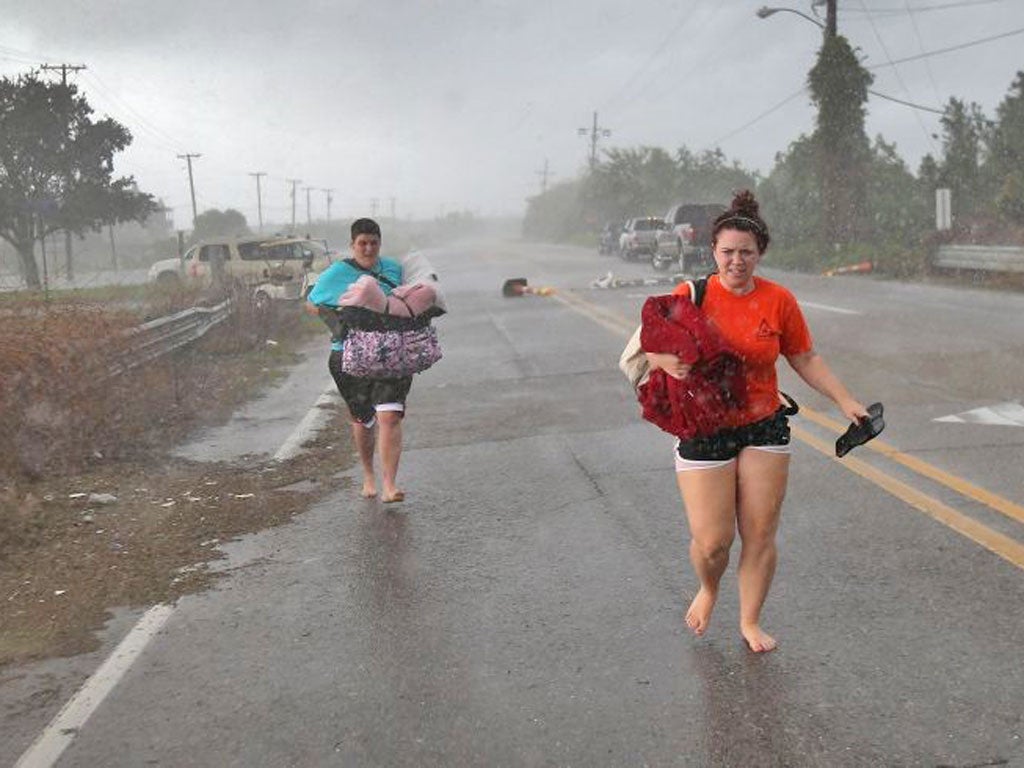Your support helps us to tell the story
From reproductive rights to climate change to Big Tech, The Independent is on the ground when the story is developing. Whether it's investigating the financials of Elon Musk's pro-Trump PAC or producing our latest documentary, 'The A Word', which shines a light on the American women fighting for reproductive rights, we know how important it is to parse out the facts from the messaging.
At such a critical moment in US history, we need reporters on the ground. Your donation allows us to keep sending journalists to speak to both sides of the story.
The Independent is trusted by Americans across the entire political spectrum. And unlike many other quality news outlets, we choose not to lock Americans out of our reporting and analysis with paywalls. We believe quality journalism should be available to everyone, paid for by those who can afford it.
Your support makes all the difference.It was 4.30am when Samuel George realised that the levees had broken; a tide of muddy water started seeping into the living area of his single-storey trailer home in the New Orleans suburb of Braithwaite.
With his electricity knocked out, George, 53, stumbled to the front door. But it wouldn't budge. Trapped in the darkness, with a hurricane roaring outside, water levels rising and no obvious escape route, he began to fear for his life. "I kind of panicked," he said. "When I finally did get the door open a little bit, the first thing I saw was my porch floating away. That was what had been blocking it. The water was initially around my ankles, but within a couple of minutes it was coming to my waist. So I went outside, and climbed up a tree onto my roof."
As day broke, Mr George witnessed a scene of devastation. His entire home town, built a stone's throw from the Mississippi, roughly 20 miles downstream from central New Orleans, was under 12 feet of water. Residents like him, who had stayed behind to ride out Hurricane Isaac, were marooned in attics and on roofs. "I could see my neighbour. But my cousin and her boyfriend, who live over the road, they never made it to their roof. So I'm certain they're dead. I'm almost positive. The water was all the way up to the top of the building, and no one had got outside, so I don't see how they could have survived."
George spent seven hours outside, praying that his perch would remain above water as gales and torrential rain continued to lash New Orleans. By the time rescuers arrived in a boat to take him to safety, he was cold, wet and exhausted. "The storm went on so long. It was completely weird," he said. "At one point, a deer swam up and climbed on to my roof. Then an armadillo did, too. The boat that eventually rescued me took the animals away, too. I was in kind of a daze. Everything I own was in that trailer. And now it's gone."
Yesterday, 24 hours after his ordeal began, George woke up on a camp bed at a YMCA in the town of Belle Chasse. With him were roughly 100 other refugees from Plaquemines Parish, a semi-rural district that appears to have been hardest hit by the category-one storm.
Hurricane Isaac, which had been downgraded to a tropical storm and was sweeping northwards into the state of Arkansas yesterday, was thankfully no Hurricane Katrina – which made landfall exactly seven years earlier, devastating swaths of New Orleans and killing more than 1,800 people.
This week, by contrast, has so far seen just two confirmed storm-related deaths (though more are likely to emerge as the storm waters recede). Flood defences recently added to central New Orleans prevented major residential areas from flooding. Damage to the city centre – which experienced powerful winds and torrential rain for roughly 36 straight hours – appears to be cosmetic.
Across Lake Pontchartrain, to the north of the city, there has been localised flooding, thanks to torrential rain (up to 20in in places), and several thousand homes were evacuated in the town of Slidell yesterday. But to most residents, the biggest inconvenience has been a dawn-to-dusk curfew to deter looting, and ongoing power cuts, which have affected more than 700,000 people.
That was scant consolation to the residents of Plaquemines Parish. Some of their neighbourhoods experienced worse damage than during Katrina and waters were still around 10ft deep in Braithwaite last night.
Terry Rutherford, of the local Sheriff's department, told The Independent that roughly 800 evacuees were now being housed in local school halls and government buildings. "If this had been a normal hurricane which moved in and blasted us for a couple of hours, we would have been fine," he said.
"But Isaac just sat there and we got the worst of it. It was incredibly slow moving, and that's what caused us trouble."
Mr Rutherford's officers used boats to rescue around 100 people – including Mr George – from roofs of homes on the eastern side of the Mississippi where levees were breached. The remaining residents of emergency shelters have been evacuated as a precaution from low-lying areas on the western side of the river.
For many, the experience raises ugly memories. "After Katrina, our town was completely devastated," said Vania Ragas, a 21-year-old student from Buras-Triumph, on the Gulf Coast, who spent the night on a camp bed at Belle Chasse High School.
"There was nothing left of our home... so this time, I'm just praying that I have a home left to go back to."

Join our commenting forum
Join thought-provoking conversations, follow other Independent readers and see their replies
Comments